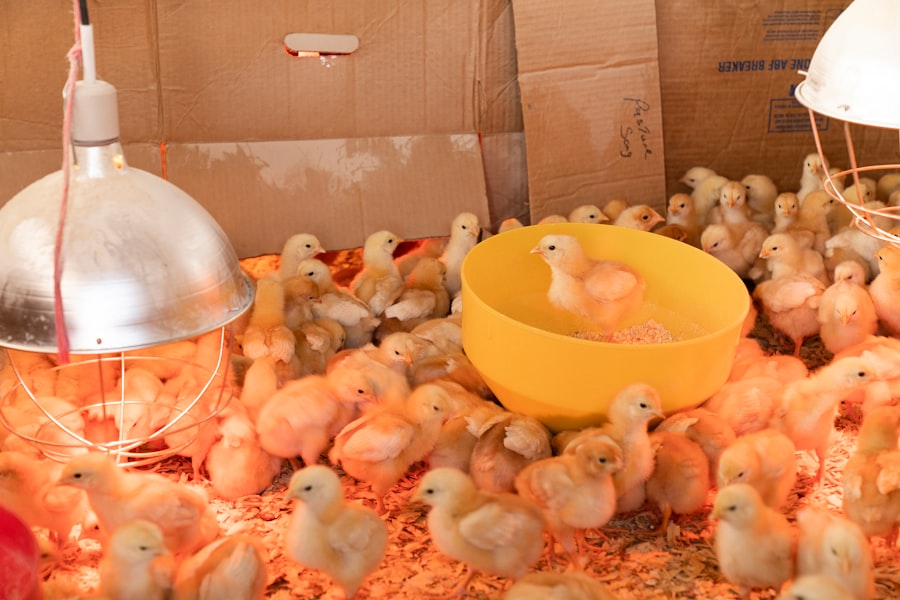Keeping chickens has become a popular trend in recent years, and for good reason. Not only do chickens provide fresh eggs, but they also offer a range of other benefits. They can help control pests in your garden, provide natural fertilizer for your plants, and even serve as friendly and entertaining pets. However, in order to keep chickens happy and healthy, it is important to have a proper chicken coop. A chicken coop provides a safe and secure environment for your chickens to live in, protecting them from predators and the elements.
Key Takeaways
- Keeping chickens has many benefits, including fresh eggs and natural pest control.
- A chicken coop is important for providing a safe and comfortable home for your chickens.
- When choosing a chicken coop, consider size, design, materials, and construction.
- Feeding your chickens requires a balanced diet and a consistent schedule.
- Providing clean water and preventative care can help keep your chickens healthy.
Choosing the Right Chicken Coop
When it comes to choosing a chicken coop, there are several factors to consider. The size of the coop is one of the most important considerations. You want to make sure that your chickens have enough space to move around comfortably and engage in natural behaviors like scratching and dust bathing. The design of the coop is also important. It should have proper ventilation to prevent overheating in the summer and adequate insulation to keep your chickens warm in the winter.
In addition to size and design, you also need to consider the materials and construction options available for chicken coops. Common materials include wood, metal, and plastic. Each material has its own advantages and disadvantages. Wood is a popular choice because it is durable and provides good insulation, but it requires regular maintenance to prevent rotting. Metal coops are sturdy and easy to clean, but they can get hot in the summer. Plastic coops are lightweight and easy to clean, but they may not provide as much insulation as other materials.
Preparing the Chicken Coop
Before adding chickens to your coop, it is important to thoroughly clean and disinfect it. This helps prevent the spread of diseases and parasites that can harm your chickens. Remove any old bedding or nesting material from the coop and scrub all surfaces with a mild detergent or disinfectant. Rinse everything thoroughly with water and allow it to dry completely before adding new bedding.
When it comes to bedding, there are several options to choose from. Straw, wood shavings, and shredded paper are all popular choices. The bedding should be clean, dry, and absorbent. It should also be changed regularly to prevent the buildup of ammonia and bacteria. In addition to bedding, you also need to provide nesting boxes for your chickens. These boxes should be dark and quiet, as chickens prefer a private space to lay their eggs.
Feeding Your Chickens
Feeding your chickens a balanced diet is essential for their health and productivity. There are several types of feed available for chickens, including pellets, crumbles, and mash. Pellets are the most common type of feed and are easy to store and feed. Crumbles are smaller pieces of feed that are easier for young chicks to eat. Mash is a loose form of feed that can be mixed with water to create a porridge-like consistency.
In addition to choosing the right type of feed, it is also important to provide your chickens with a feeding schedule. Chickens should have access to food at all times, but it is best to feed them in the morning and evening when they are most active. The amount of feed you give your chickens will depend on their age, size, and activity level. As a general rule, adult chickens will eat about 1/4 to 1/3 pound of feed per day.
Providing Water for Your Chickens
Water is just as important as food when it comes to keeping your chickens healthy. Chickens need access to clean water at all times. There are several water sources and containers available for chickens, including waterers, fountains, and buckets. Waterers and fountains are designed specifically for chickens and help prevent contamination and spillage. Buckets can also be used, but they should be cleaned regularly to prevent the buildup of algae and bacteria.
Chickens need about 1/2 to 1 cup of water per day, depending on their size and the weather conditions. In hot weather, they may need more water to stay hydrated. It is important to check the water containers regularly to make sure they are clean and filled with fresh water. In freezing temperatures, you may need to use heated waterers or provide warm water to prevent the water from freezing.
Keeping Your Chickens Healthy

Keeping your chickens healthy is essential for their well-being and productivity. It is important to be aware of the signs of illness and disease in chickens so that you can take appropriate action. Common signs of illness include lethargy, loss of appetite, changes in behavior, and abnormal droppings. If you notice any of these signs, it is important to isolate the sick chicken and seek veterinary care if necessary.
In addition to monitoring for signs of illness, it is also important to provide preventative care for your chickens. This includes vaccinations and regular health checks. Vaccinations can help protect your chickens from common diseases like Newcastle disease and infectious bronchitis. Regular health checks involve examining your chickens for any signs of illness or injury and taking appropriate action.
Protecting Your Chickens from Predators
Predators can pose a serious threat to your chickens, so it is important to take steps to protect them. Common predators include raccoons, foxes, coyotes, and birds of prey. These predators are attracted to chickens because they see them as a source of food. To protect your chickens from predators, it is important to build a predator-proof chicken coop.
A predator-proof chicken coop should have sturdy walls and a secure roof to prevent predators from gaining access. The coop should also have a strong door that can be securely locked at night. It is also important to bury wire mesh around the perimeter of the coop to prevent predators from digging under. Regularly inspect the coop for any signs of damage or weakness and make repairs as needed.
Maintaining the Chicken Coop
Regular cleaning and upkeep are essential for maintaining a healthy and productive chicken coop. It is important to clean the coop regularly to prevent the buildup of waste and bacteria. Remove any old bedding and nesting material and scrub all surfaces with a mild detergent or disinfectant. Rinse everything thoroughly with water and allow it to dry completely before adding new bedding.
In addition to cleaning, it is also important to regularly inspect the coop for any signs of damage or wear. Check for loose or broken boards, holes in the walls or roof, and any other potential entry points for predators. Make repairs as needed to ensure the coop remains secure and in good condition.
Harvesting Eggs
One of the main benefits of keeping chickens is the fresh eggs they provide. Chickens typically start laying eggs at around 5 to 6 months of age, although this can vary depending on the breed. Most chickens will lay one egg per day, although this can also vary depending on factors like age, breed, and diet.
To properly harvest eggs, it is important to collect them regularly to prevent them from becoming dirty or broken. Provide nesting boxes for your chickens to lay their eggs in, and check them daily for any new eggs. Use a clean cloth or brush to remove any dirt or debris from the eggs before storing them in a cool, dry place.
Keeping chickens can be a rewarding and enjoyable experience, but it requires proper care and attention. A chicken coop is an essential part of keeping chickens, providing them with a safe and secure environment to live in. When choosing a chicken coop, consider factors like size, design, materials, and construction options. Prepare the coop by cleaning and disinfecting it before adding chickens, and provide appropriate bedding and nesting boxes.
Feeding your chickens a balanced diet and providing them with clean water is essential for their health and productivity. Monitor your chickens for signs of illness and disease, and provide preventative care like vaccinations. Protect your chickens from predators by building a predator-proof coop, and regularly maintain the coop by cleaning and making repairs as needed. Harvest eggs regularly and store them properly to ensure their freshness.
By following these tips and providing proper care, you can enjoy the benefits of keeping chickens and have a successful experience.
If you’re interested in learning more about how to keep chickens, you’ll definitely want to check out this informative article on the Poultry Wizard website. It provides valuable insights on the importance of the floor of a chicken coop and offers practical tips on how to maintain a clean and healthy environment for your feathered friends. Whether you’re considering building your own coop or looking for recommendations on pre-made options, the article also includes a helpful guide to the Snaplock Chicken Coop, which offers convenience and durability. Additionally, it discusses the crucial aspect of choosing the right location for your chicken coop, providing guidance on factors to consider when deciding where to place it. To delve deeper into these topics and gain expert advice, click here: https://poultrywizard.com/keeping-chickens/floor-of-chicken-coop/, https://poultrywizard.com/keeping-chickens/snaplock-chicken-coop/, https://poultrywizard.com/keeping-chickens/where-to-put-chicken-coop/.
FAQs
What are the basic requirements for keeping chickens?
To keep chickens, you will need a coop or shelter, a secure outdoor area for them to roam, food and water, and bedding material for the coop.
What kind of shelter do chickens need?
Chickens need a shelter that is dry, draft-free, and well-ventilated. The coop should be large enough for the number of chickens you have and have roosting bars for them to sleep on.
What should I feed my chickens?
Chickens need a balanced diet that includes a mix of grains, protein, and calcium. You can buy commercial chicken feed or make your own using ingredients like corn, soybeans, and oyster shells.
How often should I clean the chicken coop?
You should clean the chicken coop at least once a week, removing any soiled bedding and replacing it with fresh material. You should also clean the water and food containers regularly.
What kind of predators should I be aware of?
Common predators of chickens include foxes, raccoons, and hawks. You should take steps to secure your coop and outdoor area, such as using fencing and netting, to protect your chickens from these predators.
How often should I collect eggs?
You should collect eggs from your chickens at least once a day to prevent them from becoming dirty or damaged. You can store eggs in a cool, dry place for up to a week before eating or selling them.
Meet Walter, the feathered-friend fanatic of Florida! Nestled in the sunshine state, Walter struts through life with his feathered companions, clucking his way to happiness. With a coop that’s fancier than a five-star hotel, he’s the Don Juan of the chicken world. When he’s not teaching his hens to do the cha-cha, you’ll find him in a heated debate with his prized rooster, Sir Clucks-a-Lot. Walter’s poultry passion is no yolk; he’s the sunny-side-up guy you never knew you needed in your flock of friends!







